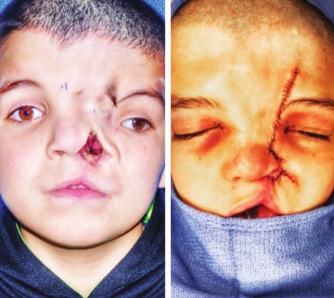RARE SURGERY LIFE CHANGING FOR INTERNATIONAL PATIENT

Procedure to correct facial deformity has more than cosmetic benefits for young patient

A young boy born with a rare congenital deformity has a new look and a new lease on life thanks to a team of medical experts in Shreveport. Mustufa Khaleel Mahmoud Issa, a 9-year-old boy from Palestine, traveled to Louisiana to have surgery to correct an oblique facial cleft, a form of facial cleft that extends from the lip to the inner canthus of the eye. The Cleft and Lip Palate Association estimates around one in 700 babies are born with a cleft around the world.
The surgery also addressed Mustufa’s hypertelorism, a condition that is evident by an abnormally large distance between the eyes. Hypertelorism occurs during development of an embryo and can be caused when something interferes with the normal development process of eyes moving closer together. These causes may be attributed to abnormal development of the bones of the forehead and the base of the skill, premature fusion of the bony plates of the skull, or a cleft between the bones of the nose or upper face.
Doctors spent six months preparing for Mustufa’s surgery, which took place on April 24 and lasted nearly 11 hours. A team of physicians from LSU Health Shreveport, including oral and maxillofacial surgeons, cleft lip/palate and craniofacial surgeons, and a specialized pediatric neurosurgeon, along with anesthesiologists, radiologists and many others, donated their time to complete the procedure. Willis-Knighton Health System fully underwrote the child’s medical and surgical care and provided housing for Mustufa and his mother throughout their stay in Shreveport.
The surgery Mustufa required to correct the facial cleft and hypertelorism went beyond cosmetic purposes. Left untreated, Mustufa would have been at continued risk for infection in the exposed area, and the bony defect in the skull base area and the way that Mustufa’s brain was herniated could have become worse over time and impacted the nasal cavity. The surgery will also give Mustufa social interaction advantages as he continues to grow up.
Following two surgeries, Mustufa is recovering well and was fitted for prescription glasses by a pediatric ophthalmologist before returning to Palestine. No additional procedures are anticipated at this time, and his doctors will continue to follow his progress through photos.
Mustufa and his mother received visa and travel funding and assistance from the Palestine Children’s Relief Fund (PCRF). For 25 years, the PCRF has provided lifesaving medical treatment to thousands of children from around the Middle East. The PCRF is the main nonprofit arranging free care for sick and injured children who cannot be treated in their homeland. In 2017, PCRF facilitated 27 children receiving treatment in North America, and they have sent more than 2,000 children since the group was formed in 1992.
